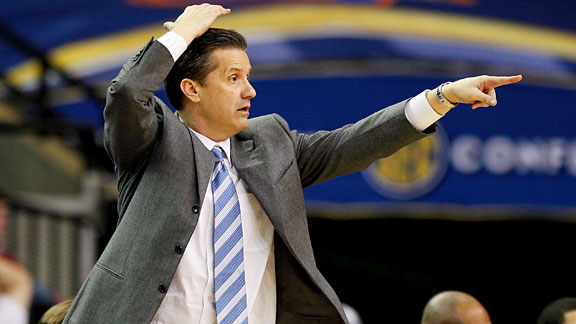Calipari Pushes ‘Nontraditional’ Scheduling Agenda, A Loss For Everyone Involved
Posted by EJacoby on May 8th, 2012By now, you’ve heard that two of college basketball’s traditional powerhouses have decided to end their annual tradition of playing each other. Kentucky and Indiana have combined for 13 national championships, are two of the strongest and historic programs in basketball history, and could easily both be ranked in the top five to begin next season. Last year they played in two classic games that included some of the best moments of the entire season. Yet, at the height of the rivalry in many years, the schools could not come to an agreement on how to continue their games. While fans on both sides continue to voice their displeasure (synopsis: IU says “convenient”; UK says “trust in Cal”) , the Kentucky coach has now explained his side of the story. Feeling emboldened by his newly-minted national championship, John Calipari wrote an extended blog post over the weekend about his scheduling needs and why they contradict with the purpose of the UK-IU rivalry. While Calipari should be praised for his direct communication with fans and refreshing transparency, his actual argument doesn’t make a whole lot of sense. He states that his primary focus is to best prepare his team for the NCAA Tournament, but in his new “nontraditional” approach he’s stripping his players of valuable competition and fans of exciting matchups to look forward to. Calipari stresses that UK is a players-first program, but the agenda that he’s pushing doesn’t actually seem more beneficial for the players, and it’s not good for college basketball fans, either.
Calipari’s post reinforces the idea that his scheduling desires are motivated by what’s best for his team during each individual season. He says that Kentucky is “going through things that no other program in the history of college basketball has gone through. No other program is losing five or six players a year.” While this is technically true, it’s not logical to give up long-term scheduling deals with other schools just because his team will look different every year. The fact that his team does in fact look different each season (presumably filled with blue-chippers as long as he’s around) would instead lead us to believe that he needs to challenge his teams right away in order to prepare the Wildcats for the rigors of March. Kentucky may still have won the title last season if it hadn’t played a challenging non-conference schedule, but early games against Kansas (neutral), Louisville (home), North Carolina (home), and Indiana (road) seemed to help speed up the learning curve of his precocious freshmen.
No head coach, including Calipari, wants to lose non-conference games. Losing those games can severely impact the RPI, which – as flawed of a measure as we all know it to be – is still the underlying metric that the NCAA Tournament Selection Committee uses to compare and contrast teams. For years fans around the country (with UK fans especially vocal) have decried the “Coach K Method” of scheduling, questioning why Duke rarely challenges itself in the non-conference season to play true road games in an opponent’s building. There’s truth to the criticism – outside of the ACC/Big Ten mandate, Duke might play one other “road” game each season, usually confined to the Duke-friendly alumni corridor of the Mid-Atlantic from DC (Georgetown) through Philadelphia (Temple) to New York (St. John’s). These look like hostile road trips on paper, but plenty of Duke fans who live nearby scoop up tickets to support the Blue Devils, making those games more neutral than you might think. Duke then fills the rest of its non-conference schedule with other neutral site games against teams it should beat and home games against solid mid-majors like Belmont and Davidson, earning wins and good RPI juice in the process.










































